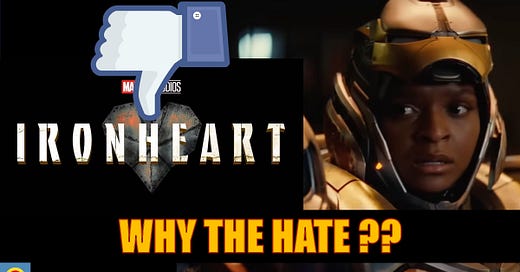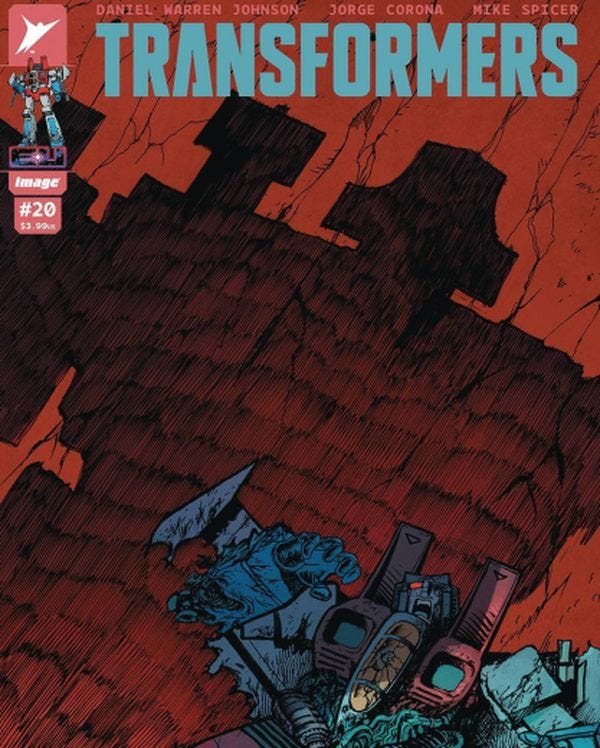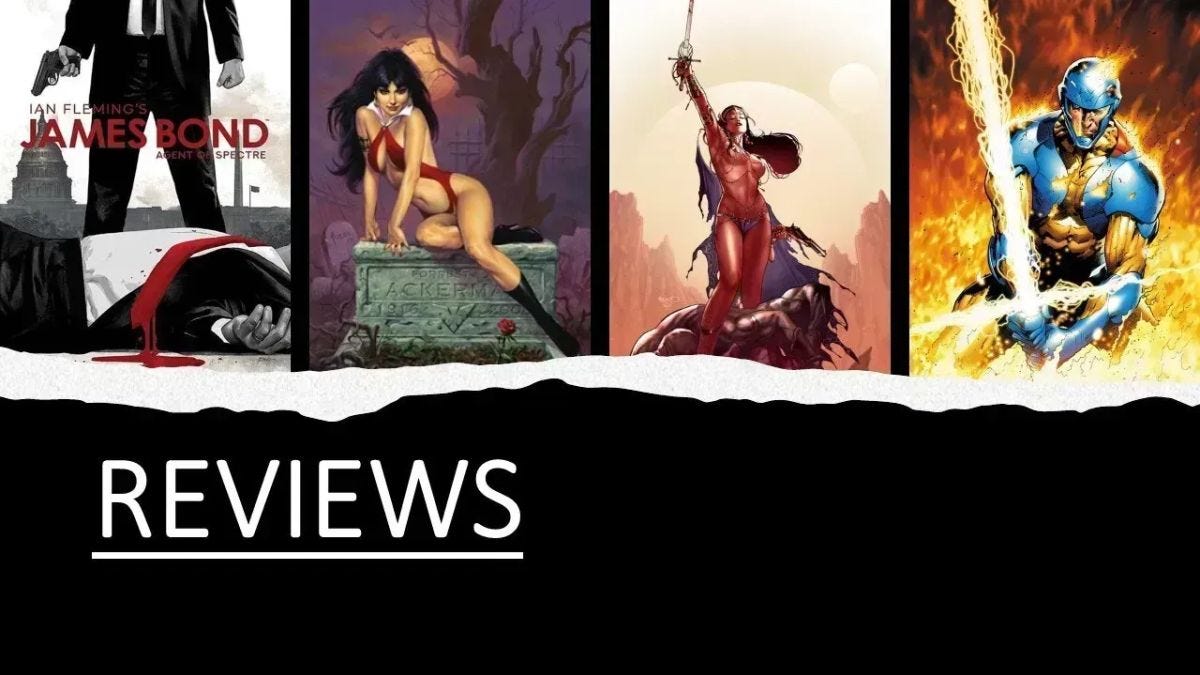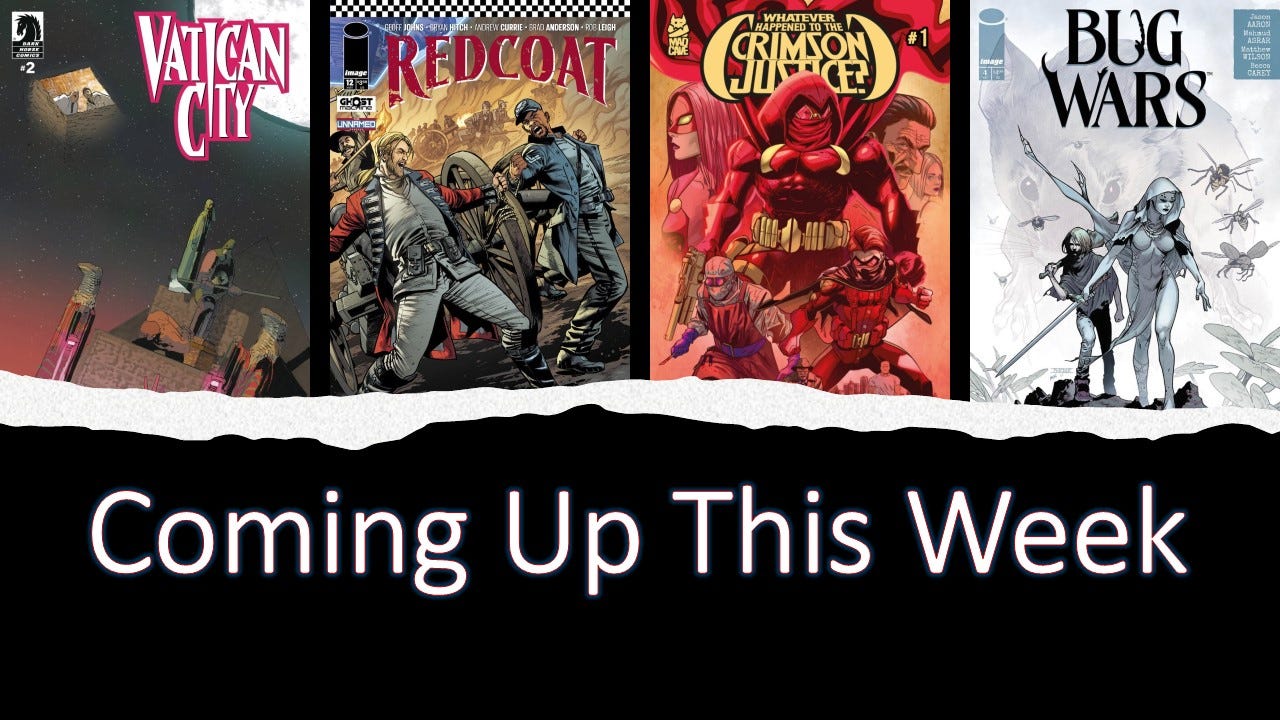Good morning, my friend,
The Ironheart trailer for the Disney+ show, dropped on May 14, 2025, got absolutely ratioed on YouTube, with dislikes crushing likes by a 10-to-1 margin in some counts. Oy!
Riri Williams, the teen genius poised to carry Iron Man’s legacy, is catching heat, and it’s not just random internet trolling. To get why fans are throwing shade, we need to dig into Riri’s comic book origins, her rocky introduction, her mixed reception, and the MCU’s handling of her so far.
Spoiler: the trailer’s backlash isn’t just about a few flashy shots—it’s a symptom of deeper gripes with Marvel and Riri’s journey.
Click on the link in the description for the full story
Riri’s Intro: A Bold Swing with Some Misses
Riri Williams debuted in Invincible Iron Man Vol. 3 #7 (May 2016), created by Brian Michael Bendis and Mike Deodato, inspired by actress Skai Jackson. A 15-year-old MIT student from Chicago, Riri’s a super-genius who reverse-engineers Tony Stark’s armor using stolen campus parts. After her dad Demetrius and best friend Natalie die in a shooting, she builds her own suit, becoming Ironheart—a name suggested by Tony’s A.I. after he falls comatose in Civil War II. Marvel pitched her as a fresh, diverse heir to Iron Man: Black, female, young, and scrappy, joining the Champions alongside Miles Morales and Kamala Khan.
Sounds like a slam dunk, right? Not quite. Riri’s intro sparked controversy from the jump. Some fans loved the diversity—Alisha Grauso of Looper called her “the true heir to Iron Man’s legacy,” and Anubhav Chaudhry of Sportskeeda praised her as an “inspiration for young people of color.” But others weren’t sold. Critics on Reddit and Quora labeled her a “Mary Sue,” arguing she was too perfect and lacked depth beyond “teen Tony Stark.” Her early actions—like stealing from MIT or later invading Latveria to topple Lucia von Bardas—felt more anti-hero than heroic, rubbing purists the wrong way. A 2016 variant cover by J. Scott Campbell for Invincible Iron Man #1 didn’t help, depicting the teen Riri in a midriff-baring crop top, which fans slammed for sexualizing her. Marvel pulled it after backlash, but the damage was done. As if the myriad of changes weren’t enough, Marvel had very few Black female writers at the time, leading to criticism that Riri’s creation by Bendis (a white dude) felt inauthentic.
Critical Reception: A Mixed Bag of Heart and Hype
Riri’s early comics got a lukewarm response. Her Invincible Iron Man run (2016-2017) was criticized for leaning too hard on Tony Stark’s shadow, with Bendis’s writing called “generic” by some fans who felt Riri’s genius overshadowed her personality. Things improved with Eve Ewing’s Ironheart #1 (2018), which scored an 8.7/10 from 15 critics on ComicBookRoundUp. Ewing grounded Riri in her Chicago roots, exploring her grief and flaws, earning praise for “fun, authentic” storytelling and Kevin Libranda’s vibrant art. Critics said it gave Riri “agency” and a “bright future,” with some calling it a must-read for young fans. The Ironheart: Meant to Fly trade (collecting #1-12) was lauded as a solid intro but critiqued for shifting focus to Marvel Universe villains over Riri’s local Chicago struggles, per AIPT Comics.
Still, not everyone was on board. Some fans on X and Reddit argued Riri’s characterization felt “unlikable” or “cliché,” especially when compared to nuanced teen heroes like Kamala Khan, whose genius is just one part of her charm. Her 2020 digital-only Ironheart series by Vita Ayala and Danny Lore didn’t make waves, and posts on X claim her comics “never sold more than 10,000 copies an issue” (barring gimmick sales), though exact numbers are tough to verify. The consensus? Riri’s a great concept—a self-made hero with no powers, just brains—but her execution hasn’t always clicked with the masses.
Sales Performance: A Niche Hero Struggling to Soar
Sales data for Riri’s comics tells a tough story. Her Invincible Iron Man run (2016) saw decent initial buzz, with Invincible Iron Man #7 (her cameo) now valued for its MCU tie-in potential, per Sell My Comic Books. But her solo Ironheart series (2018) didn’t light up the charts. Industry estimates suggest most issues sold under 20,000 copies, low for a Marvel title, and her 2020 digital-only series barely registered. Posts on X echo this, claiming Riri’s books “don’t sell,” especially compared to heavyweights like Spider-Man or even Miles Morales. Marvel’s push for diversity was praised, but as Vulture noted in 2016, Riri’s launch felt like a “pecuniary” move to some, not a storytelling win. Her niche appeal—young, tech-focused, and tied to a lesser-known corner of the Marvel Universe—hasn’t translated to blockbuster numbers, fueling skepticism about her MCU spotlight.
The MCU’s Riri: A Wakanda Misfire Sets the Stage
Riri hit the MCU in Black Panther: Wakanda Forever (2022), played by Dominique Thorne. A 19-year-old MIT whiz, she builds a vibranium detector that sparks a Wakanda-Talokan conflict. Her role? Build a suit, fight Namor, and toss snarky one-liners. Fans weren’t impressed. Reddit threads called her “generic” and “tacked-on,” with her quick-build armor feeling like a “Power Rangers knockoff.” Her personality—more quippy than compelling—didn’t scream “next Iron Man,” and some felt Marvel rushed her to set up the Ironheart series. Thorne herself said the show would dive deeper into Riri’s Chicago roots and Wakanda Forever fallout, but that promise hasn’t quelled doubts.
The Trailer: Girlboss Gloss Over Gritty Heart
Now, the Ironheart trailer. Set post-Wakanda Forever, it follows Riri back in Chicago, chasing an “iconic” legacy while clashing with Parker Robbins, aka The Hood (Anthony Ramos), a magic-wielding villain. The YouTube transcript shows Riri boasting, “I’m fed up, waiting to be acknowledged for my greatness,” and The Hood testing her with lines like, “Anyone who’s accomplished anything has to do questionable things.” It’s got Ryan Coogler’s name, slick visuals, and a tech-vs.-magic hook. So why the hate?
That Park Place nails it: the trailer’s “girlboss” vibe—snarky, stylized, and empowerment-heavy—feels like MCU autopilot. Riri’s confidence comes off as unearned, lacking the struggle that made Tony Stark’s arc in Iron Man (2008) resonate. Fans want grit, not gloss. Marvel’s marketing also leans hard on Tony Stark, with a symbolic “two thumbs up” from Robert Downey Jr. to Thorne, per That Park Place. It’s a nostalgia grab that cheapens Riri’s independence—her comics didn’t need Tony’s ghost to shine. Worse, the trailer dropped the same day as DC’s Superman trailer, which won fans over with its hopeful tone. Ironheart’s release plan—dumping three episodes on June 24, 2025—screams damage control, like Marvel’s bracing for another Echo-style fizzl
The Real Issue: Marvel’s Trust Deficit
The root of the backlash isn’t just Riri—it’s Marvel. Riri’s comic history shows she works when writers like Ewing lean into her flaws, her Chicago swagger, and her human side. She’s fought Animax, Rhino, and even ruled Latveria, not because she’s perfect, but because she’s stubborn and authentic…in the right hands. But the MCU’s Riri feels like a corporate checklist: diverse, quippy, and tied to Tony Stark to sell merch. The trailer’s polish buries her potential complexity, and fans smell inauthenticity a mile away. Reddit posts worry the show, filmed pre-2023 MCU flops like Quantumania, hasn’t learned from Marvel’s recent misses.
Add Riri’s shaky comic sales and mixed reception, and it’s clear why fans are skeptical. She’s a niche hero with a loyal but tiny following—Ewing’s run proved she can inspire with the right approach—but she’s not Spider-Man. Marvel’s banking on her to carry a show when her comics struggled to break 20,000 copies. The trailer’s failure to show Riri’s heart—her grief, her hustle, her Chicago roots—only widens the gap. Fans don’t hate Riri; they hate Marvel’s habit of hyping without delivering.
Can Ironheart Fly?
There’s hope. Ironheart has a killer setting (Chicago), a dope villain in The Hood, and Ryan Coogler’s winning touch. If it leans into Riri’s comic strengths—her flaws, her community, her tech-savvy grit—it could win fans over. But Marvel needs to ditch the girlboss shtick and let Riri be a hero, not a brand. Show her messing up, doubting herself, and earning her “iconic” status. Until then, the dislikes will keep piling up.
What’s your take? Is Ironheart doomed, or can Riri prove the haters wrong? Let me hear it in the Comments.
-Gabe
Next, our Pick of the Week for the most entertaining comic is…
If you’re a subscriber to our podcast, the audio version of this review is already live. If you’re not a subscriber, we host our feed on multiple podcast platforms for your convenience.
Also, if you’d rather listen right here on Substack, make sure to subscribe to this newsletter to get the notification for the next episode.
Now, let’s get on to this week’s reviews (and a little catch-up)
HUCK: BIG BAD WORLD #1 – Review
GREEN HORNET/MISS FURY #5 – Review
[Pick of the Week] TRANSFORMERS #20 – Review
INVINCIBLE UNIVERSE: BATTLE BEAST #1 - Review
Did you see a comic review for a title you didn’t know existed?
Did you see a comic review for a title a friend should hear about?
Tell your friends by clicking on the ‘Share’ button below!
Whatever Happened to the Crimson Justice? #1 (Mad Cave Studios)
Redcoat #12 (Image Comics)
Bug Wars #4 (Image Comics)
Vatican City #2 (Dark Horse Comics)
Silverhawks #4 (Dynamite Comics)
Grimm Fairy Tales (Vol. 2) #96 (Zenescope Entertainment)
Marvel Viewers’ Choice (Subscribe to our YouTube Channel to vote)
DC Viewers’ Choice (Subscribe to our YouTube Channel to vote)
Thanks for your support. Please share the handy dandy ‘Share’ button above with everyone you can. Your support ensures we can keep bringing you great content for a very long time.
Also, follow us on all the socials (Facebook, Instagram, Twitter, etc.) via @ComicalOpinions
Have a great day!





